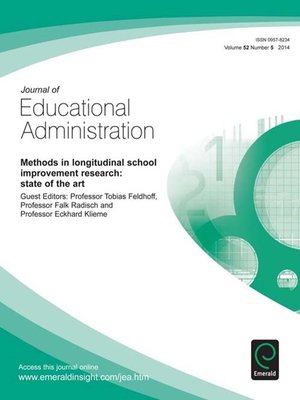Journal of Educational Administration, Volume 52, Issue 5
ebook ∣ Methods in longitudinal school improvement research: State of the art · Journal of Educational Administration
By Tobias Feldhoff

Sign up to save your library
With an OverDrive account, you can save your favorite libraries for at-a-glance information about availability. Find out more about OverDrive accounts.
Find this title in Libby, the library reading app by OverDrive.



Search for a digital library with this title
Title found at these libraries:
| Library Name | Distance |
|---|---|
| Loading... |
This ebook focuses on state of the art methods in longitudinal school improvement research and was originally based on themes arising from a 2013 conference in Frankfurt, Germany on "Designs and Methods in School Improvement Research". The resulting ebook is comprised of papers presented at the conference as well as other relevant studies sourced from leading scholars working in this domain.
As an organizational process, school improvement is aimed at impacting collective improvement capacity, the skills of its members, and the learning conditions and outcomes of students. Although school leaders aim to achieve a positive impact on school-level results, it is widely recognized that school-level changes only become evident after individual teachers recontextualize, adapt and implement them in their individual classrooms. Because longitudinal studies have not been widely used in school improvement research, the editors wished to highlight current longitudinal designs in school improvement research drawn from a variety of countries. The studies contained in this ebook deal with different contents and demands in school improvement research, demonstrate diverse possibilities in the manner of conducting longitudinal studies of school improvement and highlight advantages and disadvantages of different approaches. Topics include methodological demands in longitudinal studies of school improvement, the difficulties of assigning subjects to experimental and control groups in intervention studies on school improvement, the effects of school leadership as part of the schools' capacity, strands of school improvement research that aim at enhancing student outcomes, school leadership and effective teaching, a longitudinal experimental study of a principal coaching intervention and the effects of principal and teacher characteristics on student learning growth using a state-based standardized achievement test. As a whole the papers demonstrate the use of a wide range of longitudinal research designs and methodological approaches in studies of school improvement.







